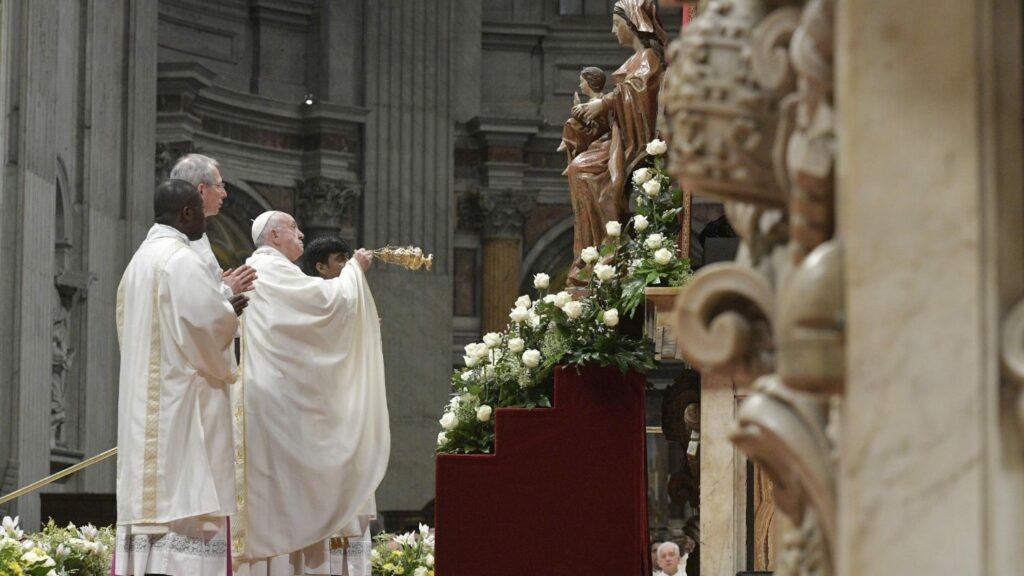In receiving the members of the Pontifical Institute of Saint Anselm in Rome on May 7, the Sovereign Pontiff invited them not to get locked into quarrels about the liturgy. « When the liturgical life is a bit of a banner of division, there is the smell of the devil in there, » he explained.
Olivier Bonnel – Vatican City
Pope Francis received this Saturday morning, May 7, the members of the Pontifical Liturgical Institute of Saint Anselm in Rome, the theological institute of the Benedictines which celebrates its 60th anniversary this year. This meeting was an opportunity for the Sovereign Pontiff to develop a reflection on the development of liturgical life and its teaching in today’s world. « Three dimensions emerge clearly from the will of the Council to renew the liturgical lifehe noted, the first is active and fruitful participation in the liturgy; the second is ecclesial communion animated by the celebration of the Eucharist and the sacraments of the Church; the third is the impetus given to the evangelizing mission by the liturgical life which involves all the baptized« .
To live and promote active participation in the liturgical life, the key is first to educate people « to enter into the spirit of the liturgy“said Francis. « Soak up the spirit of the liturgy, feel its mystery, with ever-new wonder. The liturgy is not a possession, no, it is not a profession: the liturgy is learned, the liturgy is celebrated« . The Pope invited the Saint-Anselme Institute to « breathe » this heritage.
The dangers of liturgical formalism
Participation in the liturgy must translateby a greater sense of the Church, which makes us live evangelically at all times and in all circumstances“continued François who immediately warned against”the temptation of liturgical formalism« . The Pope thus deplored the desire of some to « looking for forms, formalities rather than reality, as we see today in those movements that try to go back and deny the Second Vatican Council« . The Bishop of Rome thus regretted that in certain pre-conciliar liturgies are « something lifeless, joyless« .
François then praised the dedication of the Saint-Anselme Institute in its ability to help its students grow. « in ecclesial communion ». « The liturgical life, in fact, opens us to others, to those closest to the Church as well as to the most distant, in our common belonging to Christ.he pointed out. « Giving glory to God in the liturgy finds its counterpart in the love of neighbour, in the commitment to live as brothers and sisters in daily situations, in the community in which I find myself, with its merits and its limits.« .
The third aspect of liturgical life is sending on mission. « What we live and celebrate leads us to meet others, to meet the world around us, to meet the joys and needs of so many people who perhaps live without knowing the gift of God.continued the Pope, emphasizing how much the Eucharist always urges charity.
« Smell of the Devil »
François made a point of insisting on the fact that “the liturgical life, and its study, should lead to greater ecclesial unity« . « When the liturgical life is a banner of division, there is the smell of the devil in there, the deceiver. It is not possible to adore God and at the same time to make the liturgy a battlefield for questions that are not essential, even outdated, and to take sides, starting from the liturgy, for ideologies that divide the Churchhe said.
The Sovereign Pontiff wished to recall the fruits of the Second Vatican Council, a Council, he specified, which « wanted to prepare abundantly the table of the Word of God and of the Eucharist, to make possible the presence of God in the midst of his People« . Thus, through liturgical prayer, the Church prolongs the work of Christ in the midst of men and women of all times. « It is necessary to study the liturgy while remaining faithful to this mystery of the Churchurged the Holy Father.
« The challenges of our world and of the present moment are very strong. The Church needs, today as always, to live from the liturgyhe concluded, explaining that “we must continue this task of being formed by the liturgy« .
.

